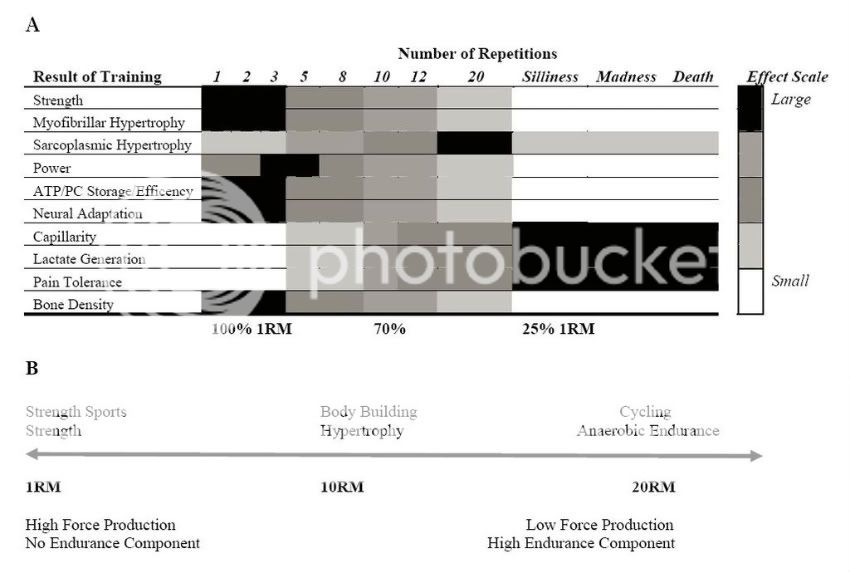Alright. I haven't read any of the other posts in this thread and I must say, once again, I have no certifications of anything like that. All I have is the fact that strength training/powerlifting and learning about it is my passion.
I will look at the title of the thread: "How can maintain my weight, but still gain strength?" I realise cardio, muscular endurance, etc are important for military life, but that is not the question being asked.
Gaining and losing weight is a matter of calories in vs. calories out. Caloric excess = weight gain. Caloric deficit = weight loss. Numbers that have been thrown at me before (they might not take into consideration a very active lifestyle. Base numbers, maybe, I guess.) are: 16 calories per/lb. for maintenance, 17+ cal/lb. for weight gain.
As I mentioned before, it is possible to get stronger while maintaining and even losing weight, via CNS adaption.
You get stronger via improved CNS (central nervous system) function, or neural adaption. I'll use a bicep curl as an example, because it is the easiest. (I don't like curls) When an untrained person does a curl, their CNS is only recruiting, say 20% (made up number) of their muscle fibers to lift the weight. Well, as that person continues training and continues to progressively use more weight, their CNS adapts and is able to recruit more of the fibers to do the work. (The principal of progressive overload, where you continually place more stress on your body via reps or intensity, forcing your body to adapt) So, say, after 5 weeks of training, the person's CNS has adapted and is now recruiting 40% of their bicep to do the curl, allowing them to use the heavier weight they now find themselves using. That a REALLY basic and REALLY unscientific explanation, but here's something a little more in depth:
The CNS: Cliffs Notes Version
When a motor neuron fires, all the fibers it serves are simultaneously activated and develop force. A motor neuron and all the muscle fibers it innervates are referred to as a motor unit, the basic functional entity of muscular activity.
Motor units can span a range of muscle fiber sizes (Type I and Type IIa/b), which also allow different force productions. Motor units are recruited in the order of their size, from smallest (Type I) to largest (Type Iib) depending on the force they must produce.
For example, when you do light load resistance training, you're recruiting predominantly Type I (slow twitch) motor units. When the load is increased, the Type Iia (fast twitch oxidative and glycolytic fibers) will be recruited with the help of the Type I fibers. When high intensity loads are utilized (90%+), the Type IIb muscle fibers (along with Type I and Type IIa) are recruited in order to produce enough force to complete the lift.
Very simply put, getting stronger is really about making the CNS more efficient at stimulating high(er) threshold motor units, maximizing the number of motor units activated, and improving the discharge frequency of those motor units. Typically, to get to a high-threshold motor unit, all the motor units below it are sequentially recruited.
Thus, with heavy resistance training, all the muscle fibers get bigger, because they're all recruited to produce more and more force with heavier weights. (This is assuming, of course, that you're getting sufficient volume in your training.)
In short, like Ron Burgundy, the CNS is kind of a big deal. As a matter of fact, during the early phases (two to eight weeks) of resistance training, a trainee's strength gains can be solely attributed to improved CNS development (not muscle growth). This is due to:
1) Increased inhibition of antagonistic muscle
2) Improved co-contraction and increased activation of synergistic muscles
3) Inhibition of neural protective mechanisms (Golgi tendon body, muscle spindle complex)
4) Increased motor neuron excitability
There is kind of a limit, though, and eventually, if your goal is to keep getting stronger and stronger, you would most likely have to look at gaining weight. For the average person not looking to compete in strength sports, though, that doesn't matter. (You don't need to get THAT strong, so gaining weight solely in an attempt to get stronger is pointless. Unless, of course, that is a personal goal.)
This picture shows the difference between sarcoplasmic and myfibrillar hypertrophy:
I will also post this chart again:
If you're looking to get stronger, start doing compound movements.
-Deadlifts
-Squats
-Overhead press
-Bench
-Rows
-Dips
-Chin/Pull ups.
-Etc.
Those will make you stronger. Things like curls and tricep kick backs do not make you "stronger". Your program should be based around lifts like those listed above, not isolation exercises. Curls should be an after thought. They're like mustard: If you want to put mustard on a sandwich, fine, but if you want to eat a bowl full of mustard, you're an idiot.
You could organise it something like this:
Monday:
Deadlifts
Bent over rows
Chin ups
Wednesday:
Bench
Strict overhead press
Dips
Friday:
Squats
Front squats
Hyper extensions
That's kind of a jumble of things thrown together. There's a lot of information out there if you wish to seek it.
Consistency is key. If you aren't going to be consistent, it's not going to work.
"Hitting the gym real hard" for two weeks will get you nowhere. It takes a long time. It takes a long time of being consistent.
Be patient. It's a marathon, not a sprint.
There's so, so much more, but that's a start.


